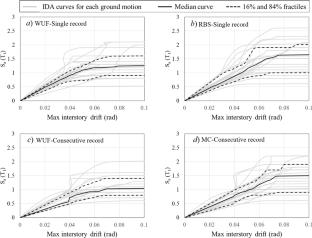Post-earthquake Behavior of Steel Moment Resisting Frames with Connections Modified by Introducing Reduced Beam Section (RBS)
Abstract
The beam-to-column connections are the most vulnerable locations in steel Moment Resisting Frames (MRFs) subjected to seismic loading. The cyclic deterioration of these structural elements during the earthquakes may cause their failure under subsequent earthquakes. This paper evaluates the post-earthquake behavior of steel moment resisting frames with Welded Unreinforced Flange (WUF) connections modified by introducing Reduced Beam Section (RBS) to improve their seismic behavior. In this regard, investigations were carried out on the connection and structure scales. At the connection scale, a T-shaped beam-to-column connection was modeled numerically and analyzed under several two-phase consecutive cyclic loading in which the maximum displacement amplitude of the first loading phase was varying. Results of this part were used to investigate the effect of multiple loading on the behavior of conventional and modified moment connections and provide data on the range of ultimate rotation capacity for the studied connections. At the structural scale, steel MRFs with WUF and modified RBS connections were compared by performing Incremental Dynamic Analysis (IDA) and extracting fragility curves. Based on the results, it can be concluded that the seismic collapse capacity of the frame with modified connections subjected to consecutive earthquake is considerably higher than that of the conventional MRF.


 求助内容:
求助内容: 应助结果提醒方式:
应助结果提醒方式:


